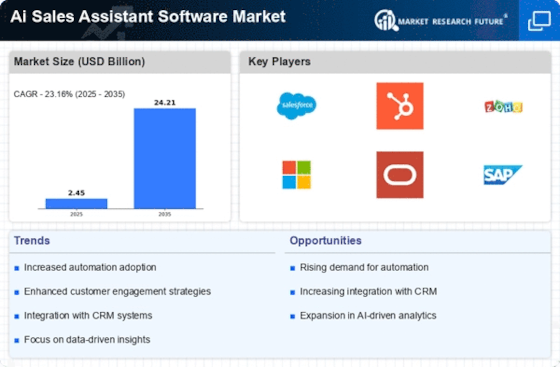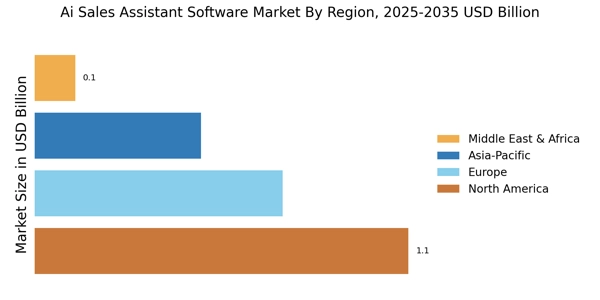Enhanced Customer Engagement
In the Ai Sales Assistant Software Market, enhanced customer engagement is becoming a pivotal focus for businesses. Companies are leveraging AI sales assistants to provide personalized interactions and timely responses to customer inquiries. This shift is supported by data indicating that organizations utilizing AI-driven tools report a 30% increase in customer satisfaction. By utilizing advanced algorithms, these software solutions can analyze customer behavior and preferences, allowing for tailored recommendations and improved service. As customer expectations continue to evolve, the demand for AI sales assistants that facilitate meaningful engagement is likely to grow, further propelling the market.
Rising Demand for Automation
The Ai Sales Assistant Software Market is experiencing a notable surge in demand for automation solutions. Businesses are increasingly seeking to streamline their sales processes, reduce manual tasks, and enhance efficiency. According to recent data, the automation market is projected to grow at a compound annual growth rate of over 25% in the coming years. This trend indicates that organizations are recognizing the potential of AI-driven sales assistants to optimize workflows and improve productivity. As companies strive to remain competitive, the integration of AI technologies into sales strategies appears to be a key driver in the Ai Sales Assistant Software Market.
Shift Towards Remote Work Solutions
The Ai Sales Assistant Software Market is witnessing a shift towards remote work solutions, which is reshaping the sales landscape. As more organizations adopt flexible work arrangements, the demand for AI sales assistants that facilitate remote collaboration and communication is on the rise. These tools enable sales teams to connect with clients and colleagues seamlessly, regardless of location. Data indicates that companies implementing remote work solutions have seen a 15% increase in productivity. This trend suggests that the Ai Sales Assistant Software Market will continue to expand as businesses seek innovative ways to support their remote sales efforts.
Growing Importance of Data Analytics
The Ai Sales Assistant Software Market is increasingly influenced by the growing importance of data analytics. Organizations are recognizing the value of data-driven decision-making in enhancing sales strategies. AI sales assistants equipped with robust analytics capabilities can provide insights into customer behavior, sales trends, and market dynamics. Recent studies suggest that companies utilizing data analytics in their sales processes experience a 20% increase in revenue. This trend underscores the necessity for businesses to adopt AI solutions that not only automate tasks but also offer analytical insights, thereby driving growth in the Ai Sales Assistant Software Market.
Increased Investment in AI Technologies
The Ai Sales Assistant Software Market is benefiting from increased investment in AI technologies. Companies are allocating significant resources to develop and implement AI-driven solutions that enhance sales performance. Recent reports indicate that global investment in AI is expected to reach over 500 billion dollars by 2025. This influx of capital is likely to accelerate the development of advanced AI sales assistants, enabling businesses to leverage cutting-edge technologies for improved sales outcomes. As organizations recognize the competitive advantages offered by AI, the market for Ai Sales Assistant Software Market is poised for substantial growth.


















